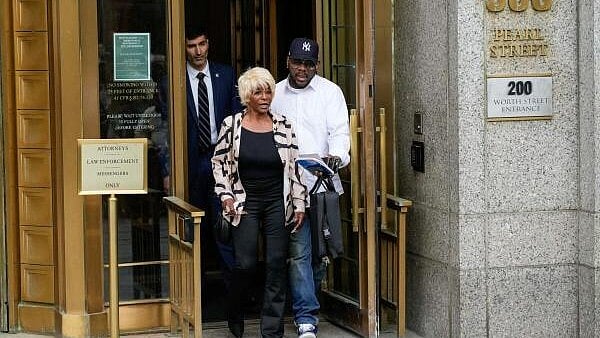
Janice Combs, mother of Sean 'Diddy' Combs, exits the federal court for Sean "Diddy" Combs sex trafficking and racketeering conspiracy trial at US court in Manhattan
Credit: Reuters Photo
New York: The judge overseeing Sean Combs’ federal trial denied an application by defense lawyers for a mistrial on Wednesday, after they argued that prosecutors had unfairly suggested through testimony that Combs was responsible for the destruction of fingerprint evidence.
The defense objected to a line of questioning Wednesday morning during the testimony of a Los Angeles Fire Department arson inspector. Answering a prosecutor’s questions, the inspector, Lance Jimenez, confirmed that fingerprint cards collected by police from an earlier trespass at the home of Scott Mescudi (the rapper known as Kid Cudi) had been destroyed, and so could not be compared to fingerprints found weeks later when Mescudi’s car was destroyed by a Molotov cocktail.
Outside the presence of jurors, Combs’ lawyers argued that those questions suggested to the jury that Combs was somehow responsible for the destruction of the fingerprint cards. The prosecution countered that their questions were entirely proper. The judge, Arun Subramanian of the Southern District of New York, ruled that testimony struck from the record, but Combs’ lawyers said it was too late.
“There’s no way to un-ring this bell,” said Alexandra Shapiro, a member of Combs’ defense team who is an experienced appellate lawyer.
Subramanian said there had been no testimony from the witness that was prejudicial to Combs. When jurors returned, the judge told them to disregard the exchange about the fingerprint cards.
Police and fire officials testified earlier in the day about a trespassing and a car fire at the Los Angeles home of Mescudi, who last week described being the focus of the music mogul’s jealous rage.
Chris Ignacio, a Los Angeles police officer, said he and a partner were called to the home, located up winding, narrow roads in the Hollywood Hills, on the morning of Dec. 22, 2011, for a possible burglary.
When Ignacio and his partner arrived, they saw a black Cadillac Escalade with tinted windows in front of the home; the vehicle immediately took off down the street and then returned. Ignacio said he noted the license plate, and later found that the car was registered to Bad Boy Productions, Inc., one of Combs’ companies.
Once inside the home, Ignacio said, he saw “high-valued” watches and purses out on a table, but the house otherwise appeared to be undisturbed. Mescudi then arrived in his Porsche; he appeared “flustered,” Ignacio said, and gave a police report.
Under cross-examination, Ignacio agreed that the episode was a trespassing and not a burglary. Mescudi, he said, did not report anything stolen from his home.
Jimenez, the arson investigator, then testified, saying that he and a partner were called to the same address on the morning of Jan. 9, 2012.
They saw a burned Porsche convertible in a driveway about 10 feet from the residence, Jimenez said; the car’s canvas top had been cut. Inside the vehicle they found a glass malt liquor bottle and a “designer-type handkerchief” nearby. He said he could smell gasoline in the car and found that the fire had not been caused by any electrical or mechanical issues with the car.
The bottle did not break and the handkerchief fell out, the inspector said; otherwise, the damage to the vehicle and the property could have been worse.
Under questioning from Christy Slavik, a prosecutor, Jimenez said he determined that the fire was not random.
“In my opinion,” the inspector testified, “it was targeted for where the car was located.”
The story of Mescudi’s conflict with Combs is a key part of the government’s racketeering case against Combs, the music mogul also known as Puff Daddy or Diddy. The government contends that Combs intimidated Mescudi, and later directed the destruction of his car, out of jealousy when Mescudi briefly dated Casandra Ventura, who was Combs’ on-and-off girlfriend.
Last week, Mescudi testified that Combs had entered his home when he was out and that he suspected that a few weeks later Combs had his car blown up with a Molotov cocktail.
Combs is charged with racketeering conspiracy and sex trafficking. He has pleaded not guilty to all charges, and has denied having anything but consensual sex with women. Lawyers for Combs have said their client was “simply not involved” in the arson incident outlined in the indictment.